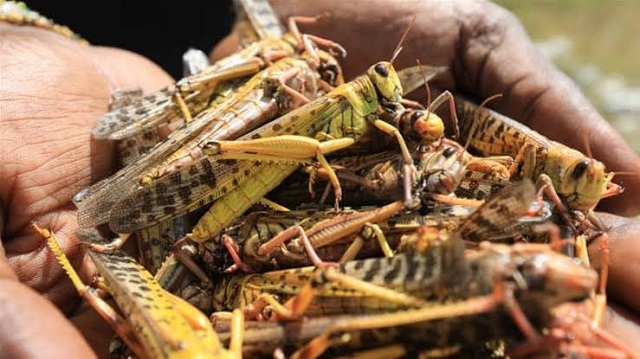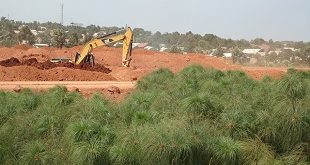
Kampala, Uganda | THE INDEPENDENT | Government is expecting more chemicals to use in aerial spraying of desert locusts.
Minister of Agriculture, Animal Industry and Fisheries Vincent Bamulangaki Ssempijja told journalists at Uganda Media Center on Tuesday that the supplier of the specialized Fenittrothion 96% ULV chemical, Twiga Chemicals has been able to make partial delivery of 400 Litres awaiting delivery of the full consignment. Government procured 10,000 litres of the chemical in February at shillings 2.8 billion.
The consignment has delayed due to the high demand for the chemical triggered by the existence of locust swarms in different parts of the region. Apart from Uganda, there are locusts in Kenya, South Sudan, Ethiopia, and Somalia among others.
Ssempijja also says the strict measures by the Kenya Government which required pre-shipment inspection in Japan also delayed delivery.
The government last week announced it had run out of the aerial spray chemicals and was using only spray pumps on the large swarms of locusts.
The swarms continue to spread partly because more swarms keep coming in. The most recent evasion entered from Kenya on 3rd March 2020.
The swarm said to have been contained covered 4 square kilometres in villages of Ariyowet, Kapambar and Kaptobole in Bukwo District.
Ssempijja says that the biggest swarm so far covered about Ten square miles in Amudat.
Government-commissioned three planes to fight locusts but one has so far been delivered.
According to the Permanent Secretary of the Ministry Pius Wakabi, the remaining two will be brought in when chemicals get to Uganda.
As government sprays, post spraying assessment is also been conducted. This includes sensitizing the public to be vigilant as locusts are feared to have laid eggs in areas they have been to.
Government is also mapping out areas where the locusts could have laid eggs in preparation for when they hatch.
Wakabi says while little is known about the eggs, if they exist or not and how long they will take to hatch, the government has to prepare to fight them in case they hatch.
Locusts have been in 24 districts in the country although without causing any significant destruction. The districts include Kotido, Amudat, Abim, Otuke, Napak, Katakwi, Amuria, Soroti, Ngora and Kumi districts. Also affected are Nakapiripirit, Nabilatuk, Moroto, Kaabong, Karenga, Bukedea, Bukwo, Kween, Agago, Kitgum, Lamwo, Pader among others.
******
URN
 The Independent Uganda: You get the Truth we Pay the Price
The Independent Uganda: You get the Truth we Pay the Price


